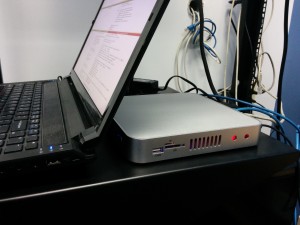 Finally found the time to set up my little fanless Celeron 1037u router project today. So far, it’s very promising!
Finally found the time to set up my little fanless Celeron 1037u router project today. So far, it’s very promising!
I installed Ubuntu Server on an elderly 4GB SD card I had lying around, with no problems other than the SD card being slow as molasses – which is no fault of the Alibaba machine, of course. Booted from it just fine. I plan on using this little critter at home and don’t want to deal with glacial I/O, though, so the next step was to reinstall Ubuntu Server on a 60GB Kingston SSD, which also had no problems.
With Ubuntu Server (14.04.3 LTS) installed, the next step was getting a basic router-with-NAT iptables config going. I used MASQUERADE so that the LAN side would have NAT, and I went ahead and set up a couple of basic service rules – including a pinhole for forwarding iperf from the WAN side to a client machine on the LAN side – and saved them in /etc/network/iptables, suitable for being restored using /sbin/iptables-restore (ruleset at the end of this post).
Once that was done and I’d gotten dhcpd serving IP addresses on the LAN side, I was ready to plug up the laptop and go! The results were very, very nice:
root@demoserver:~# iperf -c springbok ------------------------------------------------------------ Client connecting to 192.168.0.125, TCP port 5001 TCP window size: 85.0 KByte (default) ------------------------------------------------------------ [ 3] local demoserver port 48808 connected with springbok port 5001 [ ID] Interval Transfer Bandwidth [ 3] 0.0-10.0 sec 1.09 GBytes 935 Mbits/sec You have new mail in /var/mail/root root@demoserver:~# iperf -s ------------------------------------------------------------ Server listening on TCP port 5001 TCP window size: 85.3 KByte (default) ------------------------------------------------------------ [ 4] local demoserver port 5001 connected with springbok port 40378 [ ID] Interval Transfer Bandwidth [ 4] 0.0-10.0 sec 1.10 GBytes 939 Mbits/sec
935mbps up and down… not too freakin’ shabby for a lil’ completely fanless Celeron. What about OpenVPN, with 2048-bit SSL?
------------------------------------------------------------ Client connecting to 10.8.0.38, TCP port 5001 TCP window size: 22.6 KByte (default) ------------------------------------------------------------ [ 3] local 10.8.0.1 port 45727 connected with 10.8.0.38 port 5001 [ ID] Interval Transfer Bandwidth [ 3] 0.0-11.6 sec 364 MBytes 264 Mbits/sec
264mbps? Yeah, that’ll do.
To be fair, though, LZO compression is enabled in my OpenVPN setup, which is undoubtedly improving our iperf run. So let’s be fair, and try a slightly more “real-world” test using ssh to bring in a hefty chunk of incompressible pseudorandom data, instead:
root@router:/etc/openvpn# ssh -c arcfour jrs@10.8.0.1 'cat /tmp/test.bin' | pv > /dev/null 333MB 0:00:17 [19.5MB/s] [ <=> ]
Still rockin’ a solid 156mbps, over OpenVPN, after SSH overhead, using incompressible data. Niiiiiiice.
For posterity’s sake, here is the iptables ruleset I’m using for testing on the little Celeron.
*nat :PREROUTING ACCEPT [0:0] :INPUT ACCEPT [0:0] :OUTPUT ACCEPT [0:0] :POSTROUTING ACCEPT [0:0] # p4p1 is WAN interface -A POSTROUTING -o p4p1 -j MASQUERADE # NAT pinhole: iperf from WAN to LAN -A PREROUTING -p tcp -m tcp -i p4p1 --dport 5001 -j DNAT --to-destination 192.168.100.101:5001 COMMIT *filter :INPUT ACCEPT [0:0] :FORWARD ACCEPT [0:0] :OUTPUT ACCEPT [0:0] :LOGDROP - [0:0] # create LOGDROP target to log and drop packets -A LOGDROP -j LOG -A LOGDROP -j DROP ##### basic global accept rules - ICMP, loopback, traceroute, established all accepted -A INPUT -s 127.0.0.0/8 -d 127.0.0.0/8 -i lo -j ACCEPT -A INPUT -p icmp -j ACCEPT -A INPUT -m state --state ESTABLISHED -j ACCEPT # enable traceroute rejections to get sent out -A INPUT -p udp -m udp --dport 33434:33523 -j REJECT --reject-with icmp-port-unreachable ##### Service rules # # OpenVPN -A INPUT -p udp -m udp --dport 1194 -j ACCEPT # ssh - drop any IP that tries more than 10 connections per minute -A INPUT -i eth0 -p tcp -m tcp --dport 22 -m state --state NEW -m recent --set --name DEFAULT --mask 255.255.255.255 --rsource -A INPUT -i eth0 -p tcp -m tcp --dport 22 -m state --state NEW -m recent --update --seconds 60 --hitcount 11 --name DEFAULT --mask 255.255.255.255 --rsource -j LOGDROP -A INPUT -p tcp -m tcp --dport 22 -j ACCEPT # www -A INPUT -p tcp -m tcp --dport 80 -j ACCEPT -A INPUT -p tcp -m tcp --dport 443 -j ACCEPT # default drop because I'm awesome -A INPUT -j DROP ##### forwarding ruleset # # forward packets along established/related connections -A FORWARD -m conntrack --ctstate RELATED,ESTABLISHED -j ACCEPT # forward from LAN (p1p1) to WAN (p4p1) -A FORWARD -i p1p1 -o p4p1 -j ACCEPT # NAT pinhole: iperf from WAN to LAN -A FORWARD -p tcp -d 192.168.100.101 --dport 5001 -j ACCEPT # drop all other forwarded traffic -A FORWARD -j DROP COMMIT